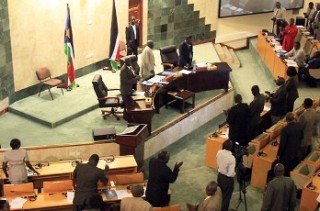Conflicting interpretations emerge over South Sudan’s parliament speaker
June 30, 2016 (JUBA) – Conflicts over interpretation of what the August 2015 peace agreement said about electing a new speaker for the would-be transitional national legislative assembly in South Sudan have emerged.

He argued that the position of speakership was compensate for the position of vice president, James Wani Igga, who is loyal to President Kiir and had to step down and gave his position to Riek Machar, leader of the SPLM-IO.
“Its interpretation is very clear, the speaker of the parliament was given to Equatorians because Wani Igga decided to step down from his position as first vice president, so the speaker was given to them because they lost this position in the government,” Ateny was quoted as saying.
Ateny further argued that President Kiir’s faction of the SPLM is the one to nominate who will become the speaker from Equatorians.
However, spokesperson of the SPLM-IO leadership, said the argument from President Kiir’s faction was wrong and a “deliberate attempt to misinterpret the provision on the election process of the speaker.”
“The peace agreement talks of Greater Equatorian members of parliament in general, no matter from which party or faction,” said James Gatdet Dak.
“He or she can be elected from any party or from any of the SPLM factions as long as the member of the Transitional National Legislative Assembly is from Greater Equatoria,” Dak further argued.
He said the understanding is that each party or faction can nominate their choice from the Equatorians in their respective groups who will compete in the election of speaker in the parliament that will involve votes of all members.
DON’T TRUST MAJORITY
Meanwhile, President Kiir while addressing SPLM youth members from his faction on Wednesday in Juba warned them not to trust in being majority in parliament.
President Kiir made it clear that he did not trust his faction’s majority in the parliament to elect a speaker from his loyalists, saying some may switch their votes and elect a speaker from the opposition groups.
“Our members of the parliament who are here should go and talk among themselves. Because we are told now that why don’t you put it to elections? And you have the majority. I said no, I don’t want it, and even I don’t trust your majority. Yes, you have two-thirds in the parliament but if one-third goes and defects, what will happen? Well they will just give it to the other side. This is what we don’t want,” Kiir said.
President Kiir therefore preferred that the speaker be selected by his faction instead of exposing the process to uncertain election.
However, the leader of the SPLM-IO faction, Riek Machar, told the United Nations-run Miraya FM radio on Monday that the parties have written a letter to IGAD to intervene by reminding the parties about the mode of electing a speaker.
The delay to agree on how to elect speaker, despite a provision in the peace agreement, has further delayed formation of the transitional national legislative assembly in the country.
(ST)
